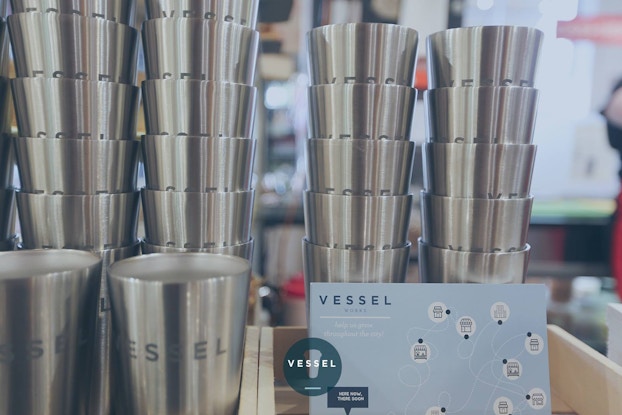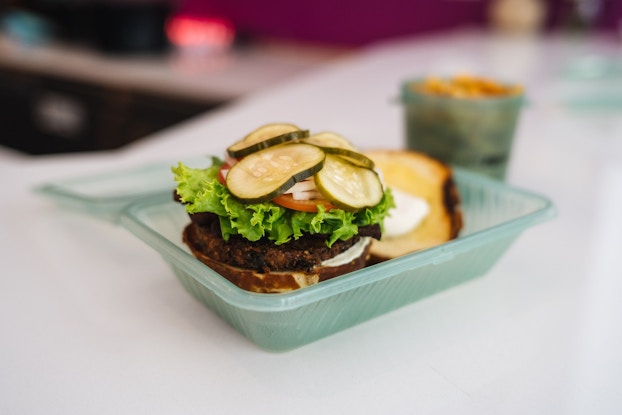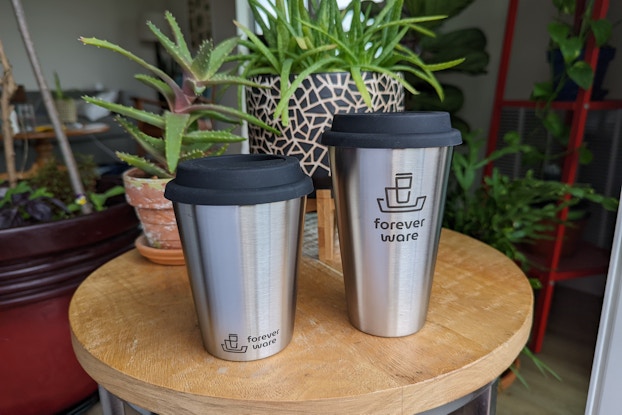Why it matters:
- Disposable packaging and food containers from restaurants account for 9 million tons of trash in the U.S. each year.
- As consumer demand for restaurant takeout soared during the pandemic, so did awareness around the amount of waste generated from takeout containers.
- Startups DeliverZero, Forever Ware, and Vessel, which make returnable takeout containers, are catering to U.S. restaurants and foodservice businesses, who lose $24 billion a year from disposable food containers, as well as the growing ranks of sustainably minded consumers.
As consumer demand for restaurant takeout soared during the pandemic, so did awareness around the amount of waste being generated from takeout containers.
Startups including DeliverZero, Forever Ware, and Vessel are all vying to provide solutions in the returnable container market.
They are doing so with the help of technology that helps track container use and manage logistics, and in many cases with the support of local governments and nonprofits that are seeking to reduce the packaging waste generated by restaurants.
Research from Upstream, which tracks the business of reuse, has found that nearly 1 trillion individual pieces of disposable foodware and packaging are used by U.S. restaurants and foodservice businesses each year, including 79% that are used for takeout and delivery. That represents 9 million tons of disposables, at a cost of $24 billion to restaurants.
A recent study by the University of Michigan, meanwhile, found that reusable containers can be an environmentally friendly and economical solution. Although they initially use more energy and generate more greenhouse gases than single-use plastics, they can break even with single-use containers after four to 13 uses, the study found.
The founders of startups DeliverZero, Forever Ware, and Vessel share here how they’re tapping the reusable container market for growth:

Vessel: Strategizing to make returnable containers the default choice for restaurant diners
In order for reuse systems to work, businesses need to provide convenient ways for customers to return the containers, and the containers need to easily integrate within restaurant operators’ current systems, said Dagny Tucker, founder of Vessel, one of the pioneers in the space.
Tucker founded Vessel in New York in 2015 when the concept of reusable, returnable containers in foodservice was new. It has since expanded to a handful of cafes in Boulder, Colorado, and Berkeley, California, with a technology-driven system for tracking containers and an infrastructure for reverse logistics, focused on reusable beverage containers.
Vessel received some financial support from the city of Berkeley and the San Francisco Department of the Environment, which invests in green solutions for the local environment.
Restaurants can partner with Vessel in two ways: either through a turnkey full-service option in which Vessel supplies everything operators need to implement a reusable container program, or by licensing the software that helps restaurants operate a reusables program with their own containers.

DeliverZero: Container tracking technology is key to success
Technology is also one of the keys to the success of DeliverZero, which operates returnable container food systems in New York, Denver, and Boulder, Colorado.
To use the system, consumers opt in to receive reusable containers when they order through food delivery platforms or in person at restaurants. A sign at restaurant counters notifies customers that they can request reusable containers for their food.
DeliverZero’s revenue model is based on usage fees paid by the restaurant, which turn out to be less than what restaurants might pay for single-use containers, said Lauren Sweeney, who became CEO of the company last March. The startup charges restaurants 7 cents per container if they have their own dishwashing on site, or DeliverZero will handle washing at a total rate of 25 cents per use. Deliver Zero outsources the dishwashing to a third party.
DeliverZero also monitors the container use at each location and automatically replenishes them, so restaurants don’t have to worry about reordering, Sweeney explained. It boasts a 98% return rate for its containers, she said.
Research from Upstream, which tracks the business of reuse, has found that nearly 1 trillion individual pieces of disposable foodware and packaging are used by U.S. restaurants and foodservice businesses each year, including 79% that are used for takeout and delivery.
The company currently works with about 200 restaurants in New York, Denver, and Boulder. It spent the past year building out its technological capabilities, rather than focusing on expanding its user base, Sweeney said.
DeliverZero has developed container tracking technology that will be made available to restaurant operators that want to launch their own reusables program in markets where DeliverZero does not yet operate.
“Now that the tech is built, we're ready to scale,” she said. “We're about to start onboarding more restaurants in those markets and a couple of new markets.”
The company has received some municipal grants to support its program. “The fact that Boulder County and the city of Boulder provided grant funding is the very reason that we're operating there,” Sweeney said.
DeliverZero has also received backing from some angel investors and is seeking additional financing.
“Our biggest barrier really has been fundraising — finding seed-stage investors who understand the size of the opportunity here,” said Sweeney.
The company is currently eyeing further expansion into Chicago; Los Angeles; Seattle; Portland, Oregon; and Austin, Texas.

Forever Ware: Consumers ‘check out’ reusable containers when they order, and check them back in upon return — like taking out library books
Natasha Gaffer, CEO at Forever Ware, said that the company’s model has evolved from offering takeout meals in reusable containers during the pandemic to becoming a tech-powered platform that is akin to renting books from a library.
Consumers essentially “check out” reusable containers when they order, and then check them back in when they return. Their account then shows that they have a credit to use returnable containers again for a future order.
Forever Ware currently has about 20 restaurant partners in multiple markets, from Minneapolis, where it first launched the service, to New Hampshire.
It started out working with independent coffee shops, has expanded to other types of restaurants and is currently pursuing partnerships with universities.
“We're seeing a shift to a more sustainable business model,” Gaffer said, citing the increased use of containers that are either recyclable, compostable or reusable.
Forever Ware offers in-store marketing materials to help educate customers, with information about the environmental impact of disposable plastic packaging and benefits of reusable containers.
“Reuse is completely new, and people don't really understand how it works yet,” Gaffer said. “We're trying to educate people on how it works and get them to try it.”
Forever Ware’s primary containers are 12- and 16-ounce insulated steel mugs with silicone lids. It also has three sizes of stainless-steel food boxes with silicone lids.
While most of the containers the company is using are off the shelf, Gaffer expects increased demand from foodservice operators for more custom-built containers and for containers designed for items such as pizza, donuts, and cookies, for example.
Forever Ware’s primary target customers are business seeking to improve their sustainability, but it’s also approaching the market as a cost-savings opportunity — Forever Ware can reduce foodservice operators’ packaging costs by 80%, Gaffer said.
The company has raised funds from family and friends and has also received some grant funding.
Gaffer and the rest of the Forever Ware staff have backgrounds as software engineers.
“Our goal has been to focus on the hardest challenges of reuse, and we feel that's technology,” she said.
Forever Ware charges restaurants 5 cents per use for its containers, plus a charge of between $25 and $200 per terminal.
The company works with a handful of foodservice customers that have transitioned to an all-reusable model, in which customers don’t have to choose between disposable and reusable.
“It's been really interesting to see consumer behavior start to change,” Gaffer said.
CO— aims to bring you inspiration from leading respected experts. However, before making any business decision, you should consult a professional who can advise you based on your individual situation.
CO—is committed to helping you start, run and grow your small business. Learn more about the benefits of small business membership in the U.S. Chamber of Commerce, here.

What can membership do for your business?
Gain tools to stay informed, competitive, and connected by becoming a U.S. Chamber of Commerce member. Membership gives you direct access to expert policy insights, economic updates, and exclusive resources designed to help your business thrive. From behind-the-scenes analysis from D.C. to exclusive discounts and expert support, U.S. Chamber membership helps you navigate change and seize new opportunities.




